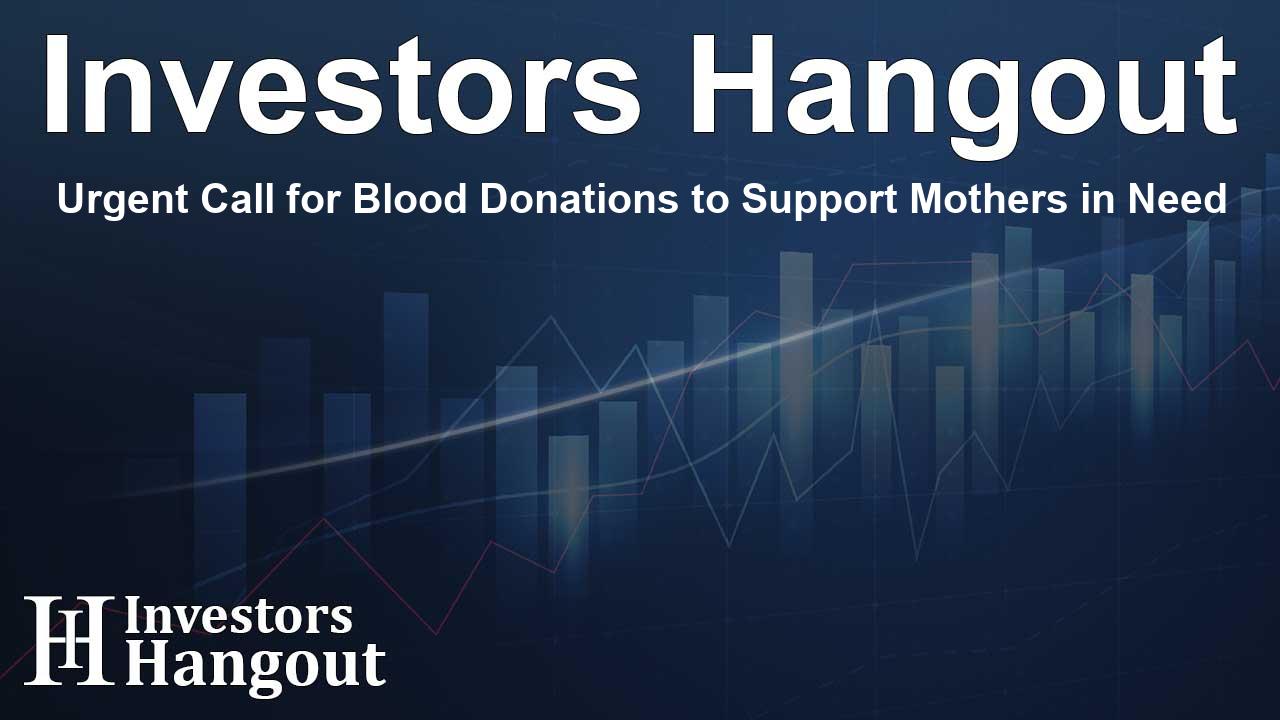Urgent Call for Blood Donations to Support Mothers in Need

Blood Donations: A Vital Need for Mothers
Every mother deserves the highest level of care and support during childbirth. However, childbirth complications can lead to emergency situations requiring immediate blood transfusions. In fact, studies indicate that 1 in 83 deliveries requires such interventions. Together with the nonprofit Vitalant, a movement is underway calling for individuals to become blood donors, emphasizing the urgent need to support mothers during one of life's most critical moments.
The Realities of Childbirth Complications
Kristin Belmonte is a poignant testament to the life-saving potential of blood donations. Having faced two severe childbirth complications, she needed an astonishing total of 42 units of blood. Another advocate, Kate McMeekin, had firsthand experience with blood transfusions, needing assistance herself during the birth of her second child. Dr. Vy Rossi, a seasoned fellow of the American College of Obstetricians and Gynecologists, has consistently observed a troubling trend: the increasing number of patients requiring blood during childbirth.
Personal Experiences Underlining the Call to Action
Belmonte shares her harrowing experience, stating, "I was bleeding out faster than they could put it in, and I ended up needing 26 units of blood that day." This severe condition, known as an amniotic fluid embolism, occurs when amniotic fluid enters into the mother's bloodstream. Such stories underline the crucial need for blood donations in these critical circumstances.
The Healing Power of Giving Back
Dr. Rossi reflects on the rewards of donation, sharing, "I've given patients as much as 50 units of blood, and that's what pushed me to do this." He further emphasizes how participating in blood drives can be therapeutic not only for recipients but also for those who donate. McMeekin adds her voice to the mission, having experienced a condition called placenta accreta, which poses a significant risk of severe blood loss. She stated, "I needed only two units of blood, but I have many friends who needed much more." Her advocacy focuses on encouraging others to donate blood for the sake of mothers undergoing such complications.
Unifying for a Greater Purpose
Belmonte, who works with Vitalant, initiated an annual blood drive during her personal time. Together, the three women joined forces to expand their reach under the initiative called Donate for Mothers. "We wanted to see how we could take all we were doing individually and make it bigger and something more meaningful," Belmonte said. Their united effort aims to ensure a robust blood supply and to guarantee that blood is available whenever emergencies arise.
Spreading Awareness and Building Community
Since they first connected through Vitalant, these advocates have actively worked to build a network involving women’s health advocacy groups and healthcare professionals, with the goal of boosting awareness about blood donation. The focus remains on elevating the care provided to mothers. Dr. Rossi encapsulated this sentiment by stating, "Because that's all we want is to take care of women well." Everyone has a connection to someone in need, whether it be a mother, sister, daughter, or friend.
Encouraging Eligible Donors to Step Forward
In the face of ongoing challenges, it is imperative to have healthy, eligible blood donors to ensure blood is readily available for all those in need. This includes various circumstances, from surgeries and trauma to cancer treatments. Individuals interested in supporting this cause are encouraged to make an appointment, learn about donation options, and explore ways to contribute. The need for blood donations will always be present, and taking action can mean saving lives.
Frequently Asked Questions
What is the significance of blood donations for mothers?
Blood donations are crucial for mothers facing childbirth complications, ensuring that they have access to necessary transfusions during emergencies.
How can I participate in blood donation efforts?
You can participate by scheduling an appointment with local blood donation centers, joining blood drives, or spreading awareness about the importance of donating blood.
Who can donate blood?
Healthy individuals aged 17 and above, who meet specific eligibility criteria, can donate blood. It's important to check with the local donation center for details.
What conditions can lead to the need for blood transfusions during childbirth?
Conditions such as placental abruption, placenta accreta, and amniotic fluid embolism can cause significant blood loss, necessitating transfusions for mothers.
Is there a greater community initiative behind blood donation for mothers?
Yes, initiatives like Donate for Mothers aim to unite the community around the cause of blood donation for mothers, raising awareness and encouraging donations.
About The Author
Contact Owen Jenkins privately here. Or send an email with ATTN: Owen Jenkins as the subject to contact@investorshangout.com.
About Investors Hangout
Investors Hangout is a leading online stock forum for financial discussion and learning, offering a wide range of free tools and resources. It draws in traders of all levels, who exchange market knowledge, investigate trading tactics, and keep an eye on industry developments in real time. Featuring financial articles, stock message boards, quotes, charts, company profiles, and live news updates. Through cooperative learning and a wealth of informational resources, it helps users from novices creating their first portfolios to experts honing their techniques. Join Investors Hangout today: https://investorshangout.com/
The content of this article is based on factual, publicly available information and does not represent legal, financial, or investment advice. Investors Hangout does not offer financial advice, and the author is not a licensed financial advisor. Consult a qualified advisor before making any financial or investment decisions based on this article. This article should not be considered advice to purchase, sell, or hold any securities or other investments. If any of the material provided here is inaccurate, please contact us for corrections.
